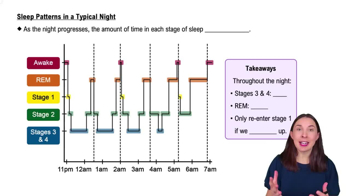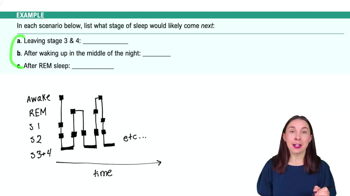Table of contents
- 1. Introduction to Psychology1h 43m
- 2. Psychology Research2h 20m
- 3. Biological Psychology2h 41m
- 4. Sensation and Perception28m
- 5. Consciousness and Sleep32m
- 6. Learning41m
- 7. Memory34m
- 8. Cognition37m
- 9. Emotion and Motivation35m
- 10. Developmental Psychology33m
- 11. Personality48m
- 12. Social Psychology41m
- 13. Stress and Health41m
- 14. Psychological Disorders44m
- 15. Treatment47m
5. Consciousness and Sleep
Sleep
Struggling with Psychology?
Join thousands of students who trust us to help them ace their exams!Watch the first videoMultiple Choice
Carmen stayed up all night studying, getting only about two hours of sleep total. While she was able to finish her exam, she was unable to focus, and much of what she had studied the night before seemed to be forgotten. Carmen's inability to remember and to stay focused during her exam is most likely due to
A
lack of intelligence.
B
sleep deprivation.
C
hypnosis.
D
daydreaming.
 Verified step by step guidance
Verified step by step guidance1
Identify the main issue in the scenario: Carmen stayed up all night studying and only got about two hours of sleep.
Consider the effects of sleep deprivation on cognitive functions such as memory and focus.
Recall that sleep is crucial for memory consolidation, which is the process of stabilizing a memory trace after the initial acquisition.
Understand that sleep deprivation can lead to difficulties in concentration and memory recall, which aligns with Carmen's experience during her exam.
Conclude that Carmen's inability to remember and focus is most likely due to sleep deprivation, rather than lack of intelligence, hypnosis, or daydreaming.

 3:25m
3:25mWatch next
Master Circadian Rhythms with a bite sized video explanation from Hannah Gordils
Start learningRelated Videos
Related Practice


































































































![Race, Genes and IQ Differences | Bret Weinstein [Mini Clip]](https://img.youtube.com/vi/IztL_m3pd70/mqdefault.jpg)



































































































